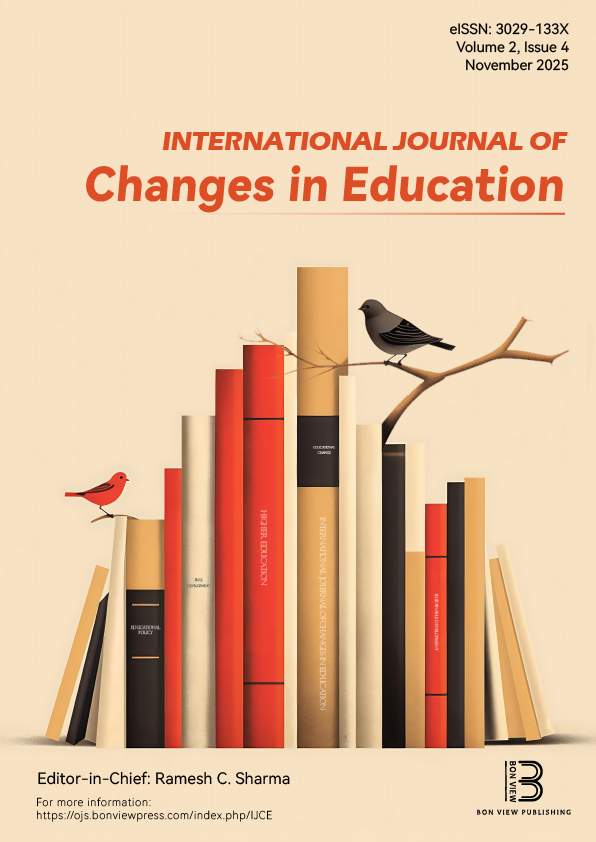Socioemotional Development, Pedagogical Actions, and Educational Practices: Perspectives of Teachers Working in Deep Brazil
DOI:
https://doi.org/10.47852/bonviewIJCE52025367Keywords:
socioemotional development, pedagogical actions in the post-pandemic, educational practices, educational psychology, Brazilian educational system, zone of proximal development, knowledge of psychologyAbstract
In deep northeast Brazil, pedagogical actions, educational practices, and socioemotional development are at a crossroad. The return to in-person classes after the COVID-19 pandemic was marked by reports of emotional crises, where cases of anxiety and depression prevailed among students. Therefore, this study aimed to analyze the dynamic and creative process of pedagogical actions and perceived students' socioemotional development with teachers working in Itabaiana, a small city 60 kilometers off the coast, in Sergipe state's backlands. This is a region that has lived with social, economic, and political problems for centuries. The methodology was qualitative and divided into two stages. The first stage consisted of three 90-minute art-education workshops with two groups of ten teachers, where Vygotsky's mediation was an essential component. In the second stage, individual semi-structured interviews were conducted. The data collected in the workshops indicated that reading, whether on psychological topics or other areas of knowledge, is not part of teachers’ daily lives. Paradoxically, participants also demonstrated a strong need for these readings. They also revealed that thinking of the classroom as a zone of proximal development is still a distant reality. This phenomenon is associated with the lack of adequate training on psychology topics in teacher training and the absence of psychologists in schools. This lack of knowledge was also present in the interviews. Of these, three categories emerged as crucial: (a) pedagogical actions in the post-pandemic; (b) knowledge of psychology; and (c) socioemotional development of students. Results showed that pedagogical actions in the post-pandemic marked by readaptation and by an intense emotional burden and socioemotional development of students were perceived as negative emotions. Opportunities for progress are limited to private conversations undertaken without assistance from psychology professionals. Although this study was done with a limited number of participants, the results point to two recommendations to policymakers: (a) bring psychology closer to schools and (b) provide extensive training in socioemotional development for teachers who work in public schools. These recommendations are of paramount importance for the future of Brazil.
Received: 5 February 2025 | Revised: 6 May 2025 | Accepted: 1 July 2025
Conflicts of Interest
The authors declare that they have no conflicts of interest to this work.
Data Availability Statement
The data that support the findings of this study are openly available at https://drive.google.com/drive/folders/1MiUSaPN3Y7YLvHB3DT5lz9hmni2VUk6c.
Author Contribution Statement
Maria Helena Almeida Carvalho: Formal analysis, Investigation, Writing – original draft, Writing – review & editing, Visualization. David Santos Silvino: Formal analysis, Investigation, Writing – original draft, Writing – review & editing, Visualization. Rosalia Tayna Conceição da Silva: Formal analysis, Investigation, Writing – original draft, Writing – review & editing, Visualization. Matheus Batalha Moreira Nery: Conceptualization, Methodology, Formal analysis, Investigation, Resources, Data curation, Writing – original draft, Writing – review & editing, Visualization, Supervision, Project administration, Funding acquisition.
Downloads
Published
Issue
Section
License
Copyright (c) 2025 Authors

This work is licensed under a Creative Commons Attribution 4.0 International License.
How to Cite
Funding data
-
Fundação de Apoio à Pesquisa e à Inovação Tecnológica do Estado de Sergipe
Grant numbers EDITAL FAPITEC/SE/SEDUC Nº 04/2023


